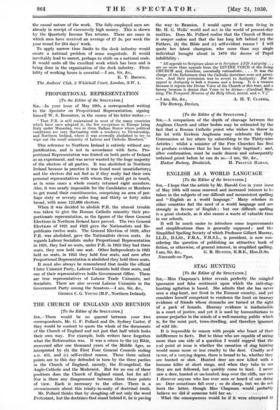PROPORTIONAL REPRESENTATION
[To the Editor of the SPECTATOR.] Sin,—In your issue of May 10th, a correspondent writing to the Spectator on Proportional Representation, signing himself W. S. RoWntree, in the course of his letter writes :-
"That P.R. is still maintained in most of the many countries which have once adopted it, the- few exceptions in Europe being Italy under Mussolini, two or three Balkan States where political conditions are very, fluctuating with a tendency to Dictatorship, and Northern Ireland, where it was avowedly abolished to try to wipe out the small minority of Labour and Catholic Members."
This reference to Northern Ireland is entirely without any justification, and is not in accordance with facts. Pro- portional Representation was foisted on both parts of Ireland
as an experiment, and was never wanted by the huge majority of the electors of all parties. It was abolished in Northern Ireland because in practice it was found most unsatisfactory; and the electors did not feel as if they really had their own personal representatives with whom they could get in touch, as in some . cases a whole county returned eight members. Also, it was nearly impossible for the Candidates or Members to .get round their constituencies, comprising an area of per- haps sixty or seventy miles long and thirty or forty miles broad, with some 125,000 electors. . - . - - - When it was decided to abolish P.R. the utmost trouble
, was taken to give the Roman Catholic minority their pro- portionate representation, as the figures of the three General Elections in Northern Ireland have proved. The two General Flections. of 1921 and 1925 gave the Nationalists and Re- publicans twelve seats. The General Election of 1929, _after P.R. was abolished, gave the Nationalists eleven seats. As regards Labour Socialists under Proportional Representation in 1921, they had no seats, under P.R. in 1925 they had three seats, they now hold one seat. Other Independents in 1921 held no seats, in 1925 they held four seats, and now after Proportional Representation is abolished they hold three seats.
It must also always be remembered that inside the official Ulster Unionist Party, Labour Unionists hold three seats, and one of their representatives holds Government Office. These are true representatives of Labour Trade Unionists, not Socialists. There are also several Labour Unionists in the Government Party among the Senators.—I am, Sir, &c.,
GEORGE C. G. YOUNG (M.P., Northern Ireland).






































 Previous page
Previous page